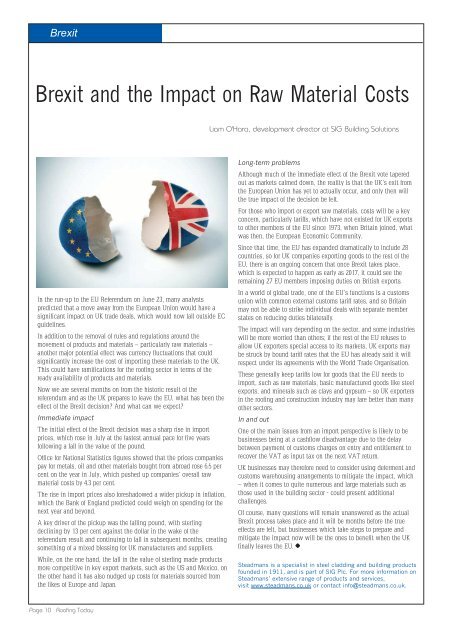Roofing
UHE2Mt
UHE2Mt
Create successful ePaper yourself
Turn your PDF publications into a flip-book with our unique Google optimized e-Paper software.
Brexit<br />
Brexit and the Impact on Raw Material Costs<br />
Liam O'Hara, development director at SIG Building Solutions<br />
In the run-up to the EU Referendum on June 23, many analysts<br />
predicted that a move away from the European Union would have a<br />
significant impact on UK trade deals, which would now fall outside EC<br />
guidelines.<br />
In addition to the removal of rules and regulations around the<br />
movement of products and materials – particularly raw materials –<br />
another major potential effect was currency fluctuations that could<br />
significantly increase the cost of importing these materials to the UK.<br />
This could have ramifications for the roofing sector in terms of the<br />
ready availability of products and materials.<br />
Now we are several months on from the historic result of the<br />
referendum and as the UK prepares to leave the EU, what has been the<br />
effect of the Brexit decision? And what can we expect?<br />
Immediate impact<br />
The initial effect of the Brexit decision was a sharp rise in import<br />
prices, which rose in July at the fastest annual pace for five years<br />
following a fall in the value of the pound.<br />
Office for National Statistics figures showed that the prices companies<br />
pay for metals, oil and other materials bought from abroad rose 6.5 per<br />
cent on the year in July, which pushed up companies’ overall raw<br />
material costs by 4.3 per cent.<br />
The rise in import prices also foreshadowed a wider pickup in inflation,<br />
which the Bank of England predicted could weigh on spending for the<br />
next year and beyond.<br />
A key driver of the pickup was the falling pound, with sterling<br />
declining by 13 per cent against the dollar in the wake of the<br />
referendum result and continuing to fall in subsequent months, creating<br />
something of a mixed blessing for UK manufacturers and suppliers.<br />
While, on the one hand, the fall in the value of sterling made products<br />
more competitive in key export markets, such as the US and Mexico, on<br />
the other hand it has also nudged up costs for materials sourced from<br />
the likes of Europe and Japan.<br />
Long-term problems<br />
Although much of the immediate effect of the Brexit vote tapered<br />
out as markets calmed down, the reality is that the UK’s exit from<br />
the European Union has yet to actually occur, and only then will<br />
the true impact of the decision be felt.<br />
For those who import or export raw materials, costs will be a key<br />
concern, particularly tariffs, which have not existed for UK exports<br />
to other members of the EU since 1973, when Britain joined, what<br />
was then, the European Economic Community.<br />
Since that time, the EU has expanded dramatically to include 28<br />
countries, so for UK companies exporting goods to the rest of the<br />
EU, there is an ongoing concern that once Brexit takes place,<br />
which is expected to happen as early as 2017, it could see the<br />
remaining 27 EU members imposing duties on British exports.<br />
In a world of global trade, one of the EU’s functions is a customs<br />
union with common external customs tariff rates, and so Britain<br />
may not be able to strike individual deals with separate member<br />
states on reducing duties bilaterally.<br />
The impact will vary depending on the sector, and some industries<br />
will be more worried than others; if the rest of the EU refuses to<br />
allow UK exporters special access to its markets, UK exports may<br />
be struck by bound tariff rates that the EU has already said it will<br />
respect under its agreements with the World Trade Organisation.<br />
These generally keep tariffs low for goods that the EU needs to<br />
import, such as raw materials, basic manufactured goods like steel<br />
exports, and minerals such as clays and gypsum – so UK exporters<br />
in the roofing and construction industry may fare better than many<br />
other sectors.<br />
In and out<br />
One of the main issues from an import perspective is likely to be<br />
businesses being at a cashflow disadvantage due to the delay<br />
between payment of customs charges on entry and entitlement to<br />
recover the VAT as input tax on the next VAT return.<br />
UK businesses may therefore need to consider using deferment and<br />
customs warehousing arrangements to mitigate the impact, which<br />
– when it comes to quite numerous and large materials such as<br />
those used in the building sector - could present additional<br />
challenges.<br />
Of course, many questions will remain unanswered as the actual<br />
Brexit process takes place and it will be months before the true<br />
effects are felt, but businesses which take steps to prepare and<br />
mitigate the impact now will be the ones to benefit when the UK<br />
finally leaves the EU.<br />
Steadmans is a specialist in steel cladding and building products<br />
founded in 1911, and is part of SIG Plc. For more information on<br />
Steadmans’ extensive range of products and services,<br />
visit www.steadmans.co.uk or contact info@steadmans.co.uk.<br />
Page 10 <strong>Roofing</strong> Today<br />
Enquiry 33


